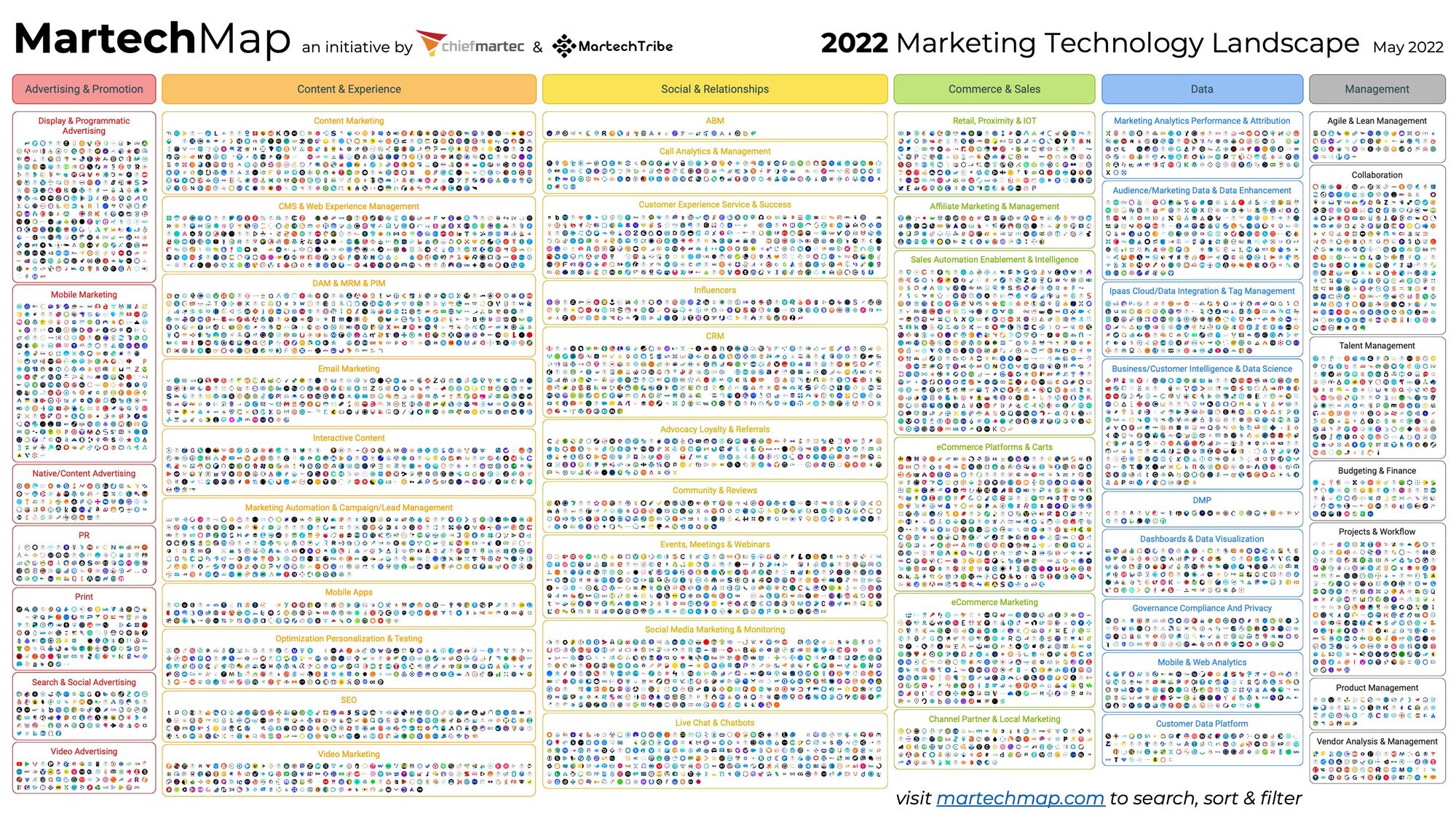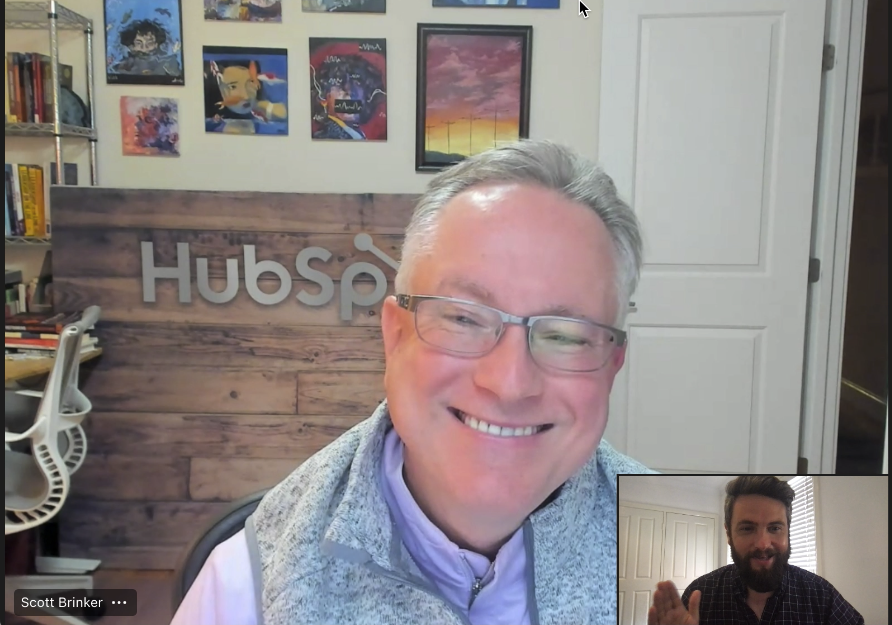Scott Brinker aka "The Godfather of Martech" gives his advice on vendor selection, ROI, martech fails, build vs buy, upskilling and more.
Martech Playbooks has a featured pro series that showcases conversations with accomplished global martech professionals.
While there are many existing and emerging martech pros out there, the "Godfather of Martech" Scott Brinker was at the top of our list of people to speak with. So when the Don accepted to be our first featured pro we were thrilled to chat and capture his insights on the martech world and best practices.
Scott Brinker is a pioneer of the martech industry and frequently speaks about the current state and future of the industry. Brinker is the editor of chiefmartec.com and is famously known for creating the martech supergraphic which maps out the continuously growing martech landscape.

Brinker steers strategic direction as VP Platform Ecosystem at Hubspot, he is the author of Hacking Marketing and also co-host on Big Martech. In the past Brinker was the co-founder and CTO of Ion Interactive, CEO of tech consultancy CyberOps, and President of Galacticomm. Brinker has a computer science degrees from Columbia University, MIT and Harvard University.
During our conversation Brinker provides both wise and practical guidance for new and experienced martech professionals.
What advice do you give marketers going through the vendor selection process?
The best thing to do is start with the customer and really understand from a business perspective: What are you trying to do? Who are you trying to reach? Where are they? What are their expectations of how they would engage with you? The more you can map out a relatively clear sense of what you believe your customer journey looks like, that's the first step.
The second step is when looking along that journey, how do I reach them here? How do I properly engage them at this touchpoint there? And you start to get a sense of what the capabilities are you need. If you're thinking through a customer lens, that becomes your checklist of how to evaluate technologies that will allow you to execute on those use cases and capabilities.
The next level is which particular technologies do I go with? One of the things to keep in mind is the maturity of your business, your marketing team, if it's just you. In martech there's a very wide range of products, some which can be very straightforward and simple, and others that can get very sophisticated. And sometimes people make the mistake of thinking, oh, I should always get the more sophisticated one, the more advanced one. The truth is, when most martech fails to deliver on expectations it's not because of the technology - it's because of not making the right investment in the talent, the skills, the processes and the human side.
When you've got a very sophisticated product, if you don't have a sophisticated team for that yet, it can be very difficult. There is a saying, "The simplest explanation is often the best" and there's a version of that for martech, the simplest martech that does what you need it to do is often the very best.
There's one other dimension of this that I'm very passionate about, and that is integrations and ecosystems. Because even if you start simple, odds are, as your business grows, as your marketing maturity grows, as you get more sophisticated, you're going to want to bring other products into your martech portfolio. Plan to change and invest in the capacity to adapt and the capacity to be agile.
What's your approach when evaluating martech value or navigating the tricky ROI conversation?
What makes ROI tricky is different marketing technologies operate in very different ways.
So there's some technologies like a landing page product and optimization that's being used very directly in demand generation. It's being used in these conversion tunnels. And you really can attribute an ROI to it.
Then unfortunately, there's a bunch of other martech [less easier to attribute ROI], and you put your finger right on some of it here, like the data layer. Other examples are even things like project management tools, collaboration tools like zoom or teams or Slack. How do you measure the ROI of these things? Well, that's really difficult because it doesn't have that sort of direct attribution. It's more of an underlying capability that's going to impact, hopefully, the performance of many, many things.
Anytime you are implementing some technology you do expect to see some kind of result. Like in the case of project management software, if you expect projects to be more organized. If you have improved visibility, you can see it. You can actually determine, is it better? Is the work you're doing, does it seem easier? Is it more productive, even in a very qualitative sense? So you should have expectations in adopting any technology. What will be the benefit? And some sort of way of measuring that benefit. It might be qualitative, it might be subjective, but qualitative and subjective isn't the end of the world.
The other way is benchmarking this with peers. You can really get a sense, particularly for getting any of these sort of major technologies adopted by a lot of companies. You can ask a peer group peer network and about how much money are they allocating to their product? What are they seeing as far as benefits go? And you start to see if you're paying more, paying less, or the amount of time spent on this versus the others. It's not perfect, but it provides a little bit of a sanity check that the investments you are making seem rational compared to other people's experiences, too.
Can you give an example of a time where an martech implementation didn't go so well?
I was the co-founder and CTO of a company called ion interactive that made us fast pipeline for interactive content. We were one of the early adopters of marketing automation when it was coming out.
I'm trying to remember the exact sequence. I think we first built something with Eloqua, and then we had a new marketing person join and say, "No, you shouldn't use Eloqua, you should use Marketo".
So we switched over to Marketo and then that marketing person left another marketing person joined and said, "Marketo? Why would you use that? You got to use Pardot." And then we switched over to Pardot.
That person left a little later, and next person comes in, they're like, "Why would you use pardot? You got to go back to Marketo."And so we finally ended up back there.
It is everything I would advise people not to do.
And it was because I think we were in the early days of martech where professionals and admins almost felt more of an allegiance to a tool than a capability. And I think you always get into a dangerous place because depending on the circumstances tools change, they get better, they get worse, new ones come in. What you want as a company is to have an allegiance to a capability and avoid thrash from the vendor of choice.
What should you consider when deciding whether to build martech in-house or buy products?
The mistake people usually make with building is twofold.
One, they sometimes end up doing this scope creep where they're reinventing the wheel. I say this is a former software engineer myself. It's always tempting to suggest, "We shouldn't even buy a third party mail server. I've got the protocols, I can write my own mails". You can get into a place where you're building things that you just shouldn't be building. However this problem has been solved like it is cheaper, faster and better to get off the commercial market.
But the second problem that I see a lot of people often underestimate with build is the lifecycle of software is something like 60 or 70% of the work associated with a piece of software you build happens after you launch the piece of software.
The ongoing maintenance cost for this because it develops this special expertise of the people who build it. Then the people who build it eventually move on, whether they take a different job in the same company or maybe they leave the company and then someone else comes in and doesn't know how the previous team worked.
This is not to say that you shouldn't have cases where you build. I just always like to caution people if you're going to build something, first of all, make sure what you're building is something that you can't get an easy commercial solution for.
Be really prepared to make the cost commitment not just for the initial build, but for the ongoing life cycle ownership. And as long as you've got that training, then yeah, I think that's a fine decision to make. The thing I get excited about is for a very long time, this used to be a dichotomy, like it was either build or buy.
Many of the things that are commercially available as platforms have become much more open and they have a lot more APIs, so you can get the platform and buy components that are plug and play. So you can build this relatively lightweight layer on top of it that creates the employee experience or the internal process flow or the external customer experience that's very tailored to what you want to do.
So it is building, but it's like standing on the shoulders of giants rather than trying to create your own giant from the ground up.
I predict that sort of build and buy I think is actually a pattern that we're seeing more and more and it feels like it gets the balance right.
How important is soft skills in the martech space?
Martech is a field of constantly learning. Soft skills shouldn't be underestimated because Martech is always changing.
It's one thing to get good at learning those changes and figuring out, okay, I understand this, here's what I'm going to do now. But to really be successful with this, you can't do this alone. You can't do this in silo. You have to bring your organisation with you.
And so that requires you to get really good at communicating both in one to one influence and persuasion, but also speaking in front of groups and being able to give really good presentations.
What advice do you give marketers learning martech and technical skillsets?
I just would say marketers should definitely want to learn what the technology can do. You want to understand it conceptual and use case wise. However, I'm still a believer that not everyone in marketing needs to be a technologist.
Marketing is now such a broad domain where all these skills that used to be important in marketing, they haven't gone away like this ability to understand audiences and crafted and map a strategy and to be able to have a financial plan of how we're going to run a media program. These things are as important today as they were 20 years ago. It's just the technology and operations component is almost like a net new area. And so the skill set within the broader marketing team just needs to be more diverse.
If you do want to get more technical and I would never dissuade someone from wanting to pursue that, one of the best ways to do it is to get hands on. A great thing to do is to set up a side project, whether it's a blog or a little ecommerce store or something like that. Not for the sake of making money (although you never know, sometimes you might), even a little bit of hands on experience takes you from that theoretical model to something where know how things get done.
Any final tips?
If you are new or even if you've been doing this for a while, martech can still seem overwhelming because just so much keeps changing so rapidly.
I just always like to reassure people that, take a deep breath, it's not you, it's the industry, it's the world. Things are moving very fast. Nobody has mastered this. We're all in this mode where we just keep learning and keep evolving. And so sometimes it's easy to feel like you're really far behind. You're probably not that far behind.
Collectively, we are all going through this together. So, yeah, don't stress about it too much and have fun.
Hear more from Scott Brinker:



